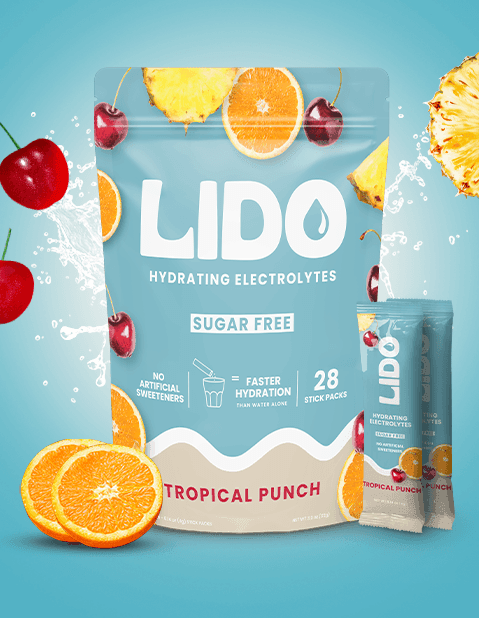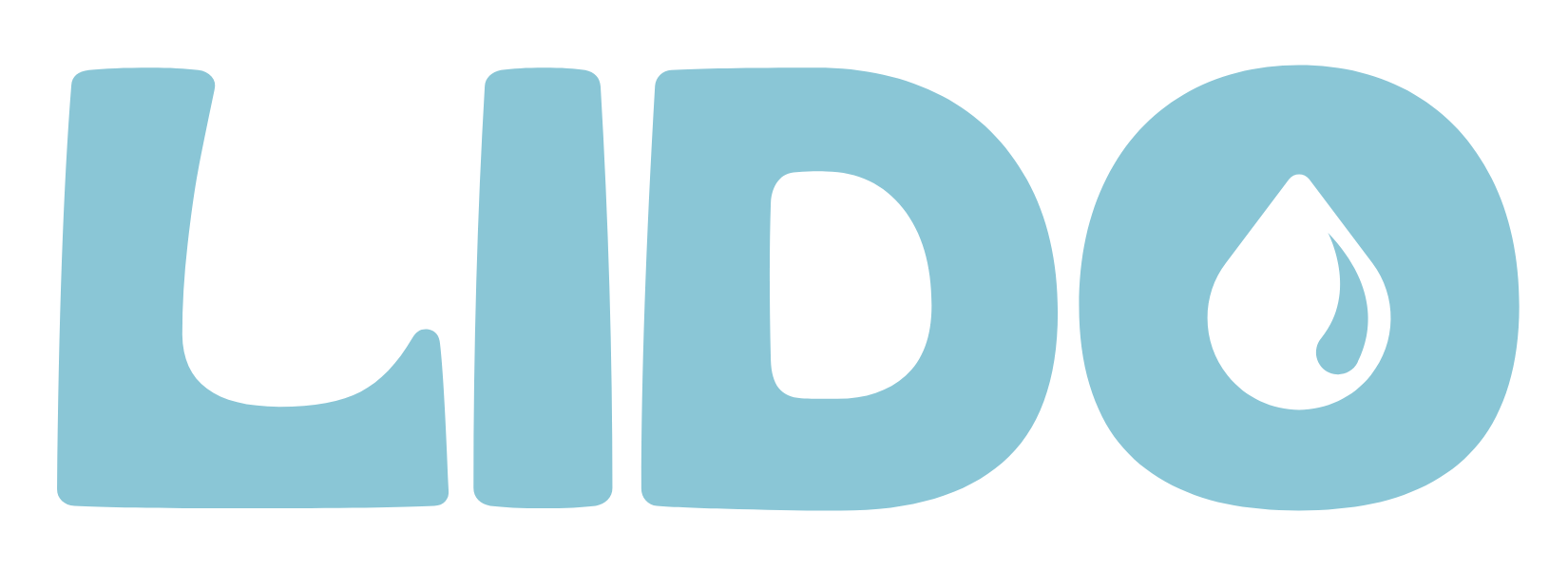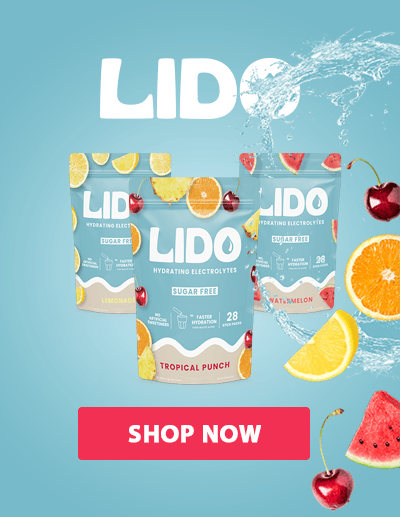Can You Drink Electrolytes While Fasting?
Jennifer DouglasShare

Whether you fast for prolonged periods or intermittently, the advice remains pretty much the same: “Stay hydrated!”
It makes sense—not consuming anything for long stretches can surely dehydrate you if you’re not careful. But given how closely electrolyte intake is tied to hydration status, it’s natural to wonder if drinking electrolytes will “break” your fast.
Some say it’s perfectly fine, while others argue it could take you out of a fasted state and negate some of its intended perks (like ketosis, which increases fat burning, and autophagy for cell regeneration).
It’s a controversial topic that has sparked debates across fasting communities. So, let’s settle this age-old electrolyte dilemma once and for all.
What are Electrolytes, and Will Drinking Them Break Your Fast?
As a quick refresher, electrolytes are minerals that carry an electric charge when dissolved in body fluids like blood, urine, and sweat.
These substances play a star role in many metabolic processes in the body, such as helping maintain fluid balance inside and outside of cells so you can stay adequately hydrated.
Now, to set the record straight: If you’re in a fasted state, consuming electrolytes alone is unlikely to sabotage your fasting efforts. There are two main reasons for this:
- Electrolytes don’t contain calories, so they do not affect blood sugar levels or stimulate an insulin response when consumed.
- Electrolytes aren’t metabolized to produce energy like carbs, fats, and proteins. In other words, they don’t energize you with calories but support the body’s ability to create and use energy.
However, it’s important to note that while consuming electrolytes while fasting is generally safe, you must be cautious about what’s in your electrolyte supplements.
Many commercial electrolyte mixes are high in calories and contain added sugars, artificial sweeteners, or other ingredients that could spike your blood sugar and technically break your fast.
With that said, carefully check the product label for whichever electrolyte supplement you intend to take, and stick to those without the unwanted extras during your fasting window.
Why Do You Need Electrolytes When Fasting?
Have you ever wondered how some folks can power through a fast while others feel like they’re about to take their last few breaths? It all has to do with electrolytes.
It’s especially easy to run low on these minerals during a fast, particularly if you’re new to the practice, among other factors.
Below, we briefly explain the factors that can impact one’s electrolyte balance during a fast.
Fasting May Raise Your Risk of Dehydration
When you fast, you abstain from foods and liquids that would otherwise provide the fluids and electrolytes you need to stay hydrated. On top of that, you’re still depleting your existing stores every day through urination, sweating, and breathing, as well as vomiting and diarrhea if you’re sick.
Essentially, you’re losing more fluids than you’re taking in, and your body doesn’t have enough to function normally and possibly help ensure a healthy fast. If you don’t replenish what’s lost, the lack of fluids could lead to dehydration and negatively alter your electrolyte balance, causing various symptoms, including fatigue, lethargy, irregular heartbeat, and muscle weakness.
Once dehydration kicks in, your first move is most likely to guzzle lots of water (if your fasting plan allows it). However, you might still feel dehydrated afterward since your body needs sodium to transfer that water into the cells.
When you drink plain H2O without the added sodium and other electrolytes, the water passes through your system without hydrating you. The solution? Add some electrolytes (particularly sodium) to the water.
Research shows sodium helps your body retain more fluid, which could stave off dehydration and boost your hydration status. Electrolyte water will help restore your fluid balance and replenish the minerals lost due to fasting, physical activities like exercising, and normal body functions.
Your Risk of Overhydration Increases While Fasting
Consuming excess fluids on your fast is also possible—and could be as harmful as not drinking enough.
Some types of fasting allow low-calorie fluids such as plain water, black coffee, or unsweetened tea during fasting windows. While a few sips here and there might help curb hunger (especially at the early stages of the fast), you may unintentionally drink more than your body needs.
When you go overboard with the fluids, you risk developing a condition called hyponatremia. “This is where sodium in the body is too low from excessive sodium loss in sweat or urine,” explains Jeffery Cline, MD, a pediatrician and sports medicine specialist with the University of Utah Health. “Or it is diluted by taking in too much free water without any electrolytes.”
Hyponatremia often has symptoms ranging from nausea and vomiting to seizures and coma, per the Mayo Clinic.
Fasting Affects Sodium Retention (and, Ultimately, Hydration Levels)
As discussed earlier, we're all trying to live a healthy life whether we're drinking filtered water or utilizing air purifiers to ensure. Sodium is a vital electrolyte that helps regulate overall hydration. It helps absorb fluids into your cells and maintain a proper balance to keep you hydrated. Unfortunately, fasting could deplete your sodium levels—and we’ll explain why.
Eating certain foods spikes your blood sugar and triggers the release of insulin. Insulin is best known for transferring sugar from the blood into the cells for energy, but it also helps you retain sodium.
Not eating during your fast causes your insulin levels to fall. With little insulin to signal the kidneys to keep hold of sodium, they start excreting more than usual. The medical term for this accelerated sodium loss is natriuresis.
According to research, another mechanism could be driving this natriuresis effect: Sodium-Glucose Transport Protein 2 (SGLT2). When blood sugar increases (like after a meal), SGLT2, a protein in the kidneys, reabsorbs glucose from the renal tube back into the blood.
For every glucose molecule retained, sodium is also reabsorbed in a 1:1 stoichiometric ratio. Since fasting reduces blood sugar, it inhibits SGLT2 and causes the kidneys to excrete glucose and sodium through urine.
If either scenario comes true and you don’t replace the lost sodium, it’s almost inevitable that an imbalance will occur, and you’ll become dehydrated.
How Much Does Fasting Increase Your Need for Electrolytes?
So far, we’ve discussed whether drinking electrolytes breaks your fast and why people lose more of them while fasting. If you’re wondering how much extra electrolytes are depleted, the answer depends mainly on:
- how long you fast (longer fasts deplete more electrolytes)
- your activity level during your fasting window (more sweating, higher fluid and electrolyte losses)
- your dietary habits (low-carb diets increase sodium losses through urine)
- your body chemistry (think metabolism, salt sensitivity, etc.)
Since sodium hydrates you the most out of all electrolytes, let’s look at how much is generally lost while fasting.
A review published in The American Journal of Medicine suggests that the initial 24 hours of fasting can lead to sodium losses from 1,100 to 5,700 mg. As the fasting continues, there’s a gradual decline of 23 to 345 mg/day. Combine that with an estimated 3,608 mg already lost through urine, plus 4,800 to 6,000 mg possibly depleted from heavy sweating during a work shift in heat.
Additionally, researchers examining the SGLT2 mechanism (discussed earlier) predicted that a 24-hour fast could result in an additional 1,610 mg of sodium excretion in a healthy person beyond normal levels. For someone with type 2 diabetes, the extra sodium loss skyrockets to 2,553 mg due to increased SGLT2 activity.
After examining findings from multiple studies on extended fasting [1][2][3], the most dramatic sodium losses seem to occur during the first four days and then stabilize around Day 10. Here’s a quick overview of the daily estimated losses:
- Day 1: Depending on the individual, at least 1,000 mg of extra sodium is lost, or possibly higher.
- Day 2: Around 1,200 mg more sodium is depleted than usual and continues to rise.
- Day 4: Peak sodium losses of anywhere from 1,600 to 3,500 mg than usual before declining.
- Day 10: Finally, your sodium losses stabilize to just 100-230 mg daily above regular levels.
Sodium loss peaks around Day 4, but let’s be honest: most people would struggle to fast that long before intense hunger sets in. For this reason, most stick to shorter fasting periods in the 12 to 16-hour range. Those doing these shorter fasts may not lose massive amounts of sodium, but that doesn’t mean they’re in the clear.
Food is our primary source of sodium. So, when you’re not eating for a certain period (like during a fast), finding other means to replace the lost sodium is essential. We’ll cover ways to replenish them in just a bit.
What Electrolytes Should You Take While Fasting (and Why)?
During your fasting window, you miss out on hydrating electrolytes from foods and drinks that help regulate critical bodily functions, including fluid balance. Replenishing these minerals is crucial, especially if you’re going “food-free” for at least 24 hours or are physically active while fasting.
Given the range of minerals that qualify as electrolytes, each naturally offers different benefits. Here are the primary ones you should focus on replenishing while fasting:
- Sodium: As one of the most abundant and vital electrolytes for fluid balance and hydration, it’s obvious that you should add more sodium to your diet while fasting. Besides, you lose significant amounts of it through increased urinary excretion and sweating. Sodium improves hydration by helping cells absorb fluids and maintain the proper fluid balance. Not replacing sodium, especially when fasting, can lead to dehydration, dizziness, headaches, fatigue, and muscle cramps. Abnormally low levels can also lead to seizures, coma, restlessness, difficulty sleeping, and more, per Cleveland Clinic.
- Potassium: Potassium works alongside sodium to regulate fluid balance and blood pressure. It is vital for proper muscle contractions, including the heart and nerve signal transmission. Replenishing potassium during a fast prevents hypokalemia, which carries symptoms such as muscle cramps, weakness, and irregular heartbeats.
- Magnesium: Magnesium supports hundreds of enzymatic reactions in the body and aids muscle and nerve function. When fasting, magnesium stores can deplete, potentially causing muscle cramps (common in ketosis), fatigue, nausea, and poor sleep. If you’re fasting for three or more days, consider upping your magnesium intake.
The Best Way to Replenish Your Electrolytes When Fasting
Again, a good portion of your daily electrolytes comes from your diet. However, since the goal is to restrict calories during your fast, you must look elsewhere to get your daily fill of vital electrolytes like sodium, potassium, and magnesium.
The good news is that you can take various electrolyte products during your fast to stay hydrated. Consider options that contain zero sugar, GMOs, or other artificial ingredients. They should also be keto, paleo, and vegan-friendly. Furthermore, a good-quality electrolyte mix should provide 500-1000 mg of sodium, 200-500 mg of potassium, and 50-100 mg of magnesium per serving.
Alternatively, you could get electrolytes (sodium, in particular) by adding salt to plain water or whatever suits your fasting plan. In any case, you can’t go wrong getting in your electrolytes during your fast, as doing so will help keep you hydrated, energized, comfortable, and happy along your health and wellness journey.
Final Thoughts
Whether you’re fasting for weight loss, health, or religious purposes, staying hydrated is incredibly important—and a crucial part of that is consuming ample electrolytes during your fasting window.
Most of us get our electrolytes from our food, but since fasting restricts caloric intake, consuming low-calorie, sugar-free electrolyte supplements is the way to go, as it will keep you hydrated without sabotaging your fasting efforts. Also, choose an electrolyte product formulated with sodium, potassium, and magnesium—the three most hydrating electrolytes.
Replenishing these essential minerals while fasting minimizes the risk of dehydration, over hydration, and other unwanted outcomes that can arise from electrolyte deficiencies. It also helps you feel more energized and more likely to reach your fasting goals.





